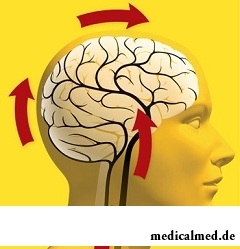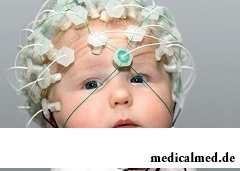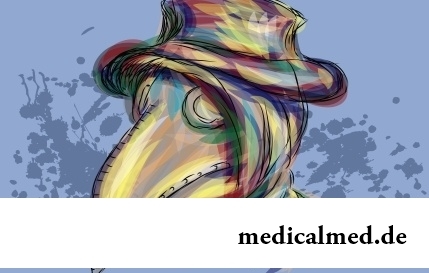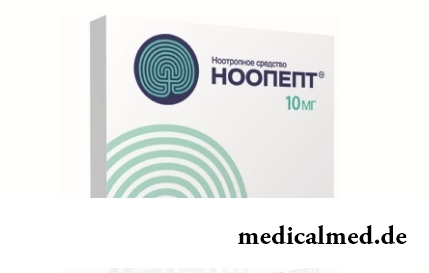





Encephalopathy
Short characteristic of a disease

Encephalopathy is a pathological damage of a brain owing to death of nervous cells that is caused by disturbance of blood supply and oxygen insufficiency of brain fabric.
Encephalopathy is not an individual disease, it is the combined concept meaning various morbid conditions and diseases. Encephalopathy can be observed both at adults, and at children.
Types of encephalopathy
Distinguish the inborn and acquired encephalopathy.
Inborn encephalopathy arises because of action of disturbing factors in labor, genetic defects or anomalies of development of a brain. Birth trauma and a hypoxia of a brain can be the reasons of inborn encephalopathy. Inborn encephalopathy still call perinatal.
As it was already told above, perinatal encephalopathy most often arises and develops as a result of morbid conditions during pregnancy or childbirth. Refer damages and morbid conditions of a brain which arise in a period of 28 weeks of pregnancy till 7 in the afternoon of the child's life to perinatal encephalopathies.
Risk factors of development of perinatal encephalopathy are premature and late births, a multiple pregnancy, reception by the pregnant woman of some medicines, placental detachment, complications at the time of delivery, age of mother (it is less than 20 years or 40 is more senior).
Symptoms of inborn encephalopathy is the uneasy behavior of the newborn, frequent crying, inadequate photoharmoses and a sound, the zaprokidyvany heads, vypuchivany an eye, frequent vomiting. Symptoms of perinatal encephalopathy can be defined in maternity hospital. At the child with such pathology heartbeat disturbance, weak or late shout, lack of sucking reflexes is observed.
If manifestations of injury of a brain have an effect not at once, and through quite long period, speak about residual encephalopathy. This pathology arises after perinatal encephalopathy after a while.
It is rather difficult to diagnose residual encephalopathy in some cases as in the perinatal period symptoms of pathology are rather short-term, and the recurrence can be shown later a wide interval of time. Infectious or inflammatory diseases, increase in arterial pressure, a craniocereberal injury can provoke a recurrence of residual encephalopathy.
The acquired encephalopathies - develop in the post-natal period. There are several types of the acquired encephalopathy.
Posttraumatic encephalopathy - arises owing to the postponed craniocereberal injury.
Toxic encephalopathy - arises owing to impact on an organism of neurotropic and bacterial toxins.
Beam encephalopathy - arises owing to impact on a brain of ionizing radiation.
Metabolic encephalopathies - arise at various diseases of internals. At the same time toxic substances which are formed during a disease get to a big circle of blood circulation and cause metabolic damage of a brain.
Vascular encephalopathy - arises owing to chronic disturbances of blood supply of a brain.
Distsirkulyatorny encephalopathy - arises owing to pathological changes of tissue of brain because of vascular and brain frustration.
Distinguish the venous, atherosclerotic, hypertensive, and also mixed distsirkulyatorny encephalopathy.
Allocate three degrees of distsirkulyatorny encephalopathy.
The first degree of encephalopathy is characterized by decrease in memory, irritability, a headache, an alarming dream.
The second degree of encephalopathy is characterized by rather expressed symptoms. The headache becomes a constant, decrease in memory, slackness, apathy, frustration of a dream is observed.
The third degree of distsirkulyatorny encephalopathy is characterized by heavy changes of brain fabric, symptoms of a disease are aggravated. There are paresis, vascular parkinsonism, the speech is violated.
Encephalopathy symptoms
Encephalopathy symptoms – are rather various and depend on a form and a stage of a disease. At the initial stage decrease in memory and working capacity, the general fatigue, a sleep disorder, slackness is observed. At survey decrease rumors and sight, a tone of muscles, a lack of coordination is observed.
Severe damage of a brain leads to severe headaches, dizziness, vomiting and nausea, disorders of consciousness, paresis and various mental disorders. In an effect can be observed lag in development and problems in education of children.

Diagnosis of encephalopathy
At diagnosis of encephalopathy an important role is played by data of the anamnesis.
Also use an electroencephalography, a computer tomography and a tomography by method of nuclear magnetic resonance.
Carry out biochemical analyses of blood, a research of urine and cerebrospinal liquid.
Treatment of encephalopathy
Treatment of encephalopathy is directed to elimination of symptoms, and also to treatment of a disease which led to damage of a brain.
At acute heavy encephalopathy use hemoperfusion, a hemodialysis, ventilation of the lungs, parenteral food. Use drugs which reduce intracranial pressure and interfere with development of spasms. Also appoint the drugs improving blood circulation of a brain.
Additional treatment of encephalopathy assumes use of physical therapy and reflexotherapy, respiratory gymnastics.
The liver is the heaviest body in our body. Its average weight makes 1,5 kg.

Each person has easy indispositions which he transfers "standing", trying not to ask for medical care. Argu...
Section: Articles about health
The business lady, the become mother, it is necessary to solve an array of problems. But of them is main: how to combine the beloved child and work? What traps trap the working mother and how she needs to behave?...
Section: Slideshow
Residents of big cities quite often have a disease which is known as the syndrome of chronic fatigue (SCF) today. This illness affects the people belonging to various social and demographic groups and living on all continents. Most of all SHU are subject women aged from 25 up to 45 years. Statistically, the number of cases fluctuates in the different countries from 10 to 37 people on 100 thousand, but specialists believe that these figures are significantly underestimated as people, страдающ...
Section: Articles about health
From the failure of work of immune system which is shown in the form of an allergy, statistically, more than 40% of the population of the globe suffer. In большинс...
Section: Articles about health
The problem of diagnosis was and remains to one of the most important in medicine. From that, the reason of an indisposition of the patient will be how precisely defined, eventually success of treatment depends. In spite of the fact that the majority of the diagnostic methods applied in about...
Section: Articles about health
Milk and products of its processing by right occupy one of the main places in a diet of the modern person. They contain proteins, necessary for normal life activity, fats, vitamins and microelements, and are an important part of various medical diets....
Section: Articles about health
The endocrine system carries out in a human body extremely important role, practically all processes of life activity регулируютс...
Section: Articles about health
What they, women? Beautiful, gentle, passionate and at the same time windy, gusty, and nervous. And what is stranger: have all these qualities of the woman at the same time. But here only the mood their time sharply changes on completely opposite: in the morning...
Section: Articles about health
On the head of the person about one million hair follicles, or as they are called still, hair bulbs are located. At the time of the birth most of them is in the "sleeping" state, but within several weeks follicles become more active, and from them hair begin to grow. Intensity of this process is individual, and during life it can change. Genetic predisposition, a physical and emotional state, aggressive influence affects the growth rate of hair out of...
Section: Articles about health
Not without reason doctors say that 90% of diseases begin or develop because of misoperation of intestines. Disturbance of its functions связ...
Section: Articles about health
Subfebrile temperature call fervescence to 38 degrees, and subfebrile condition - existence of such temperature over 3 days, and quite often it happens without the visible reasons. Existence of subfebrile condition - a strong indication of disturbances in an organism which can...
Section: Articles about health
The words "disease" and "patient" not without reason come from one root – "pain". As a rule, symptoms of illnesses thoroughly spoil to patients life. However from this rule there are exceptions. Some diseases are shown by signs which can cause even positive emotions. It is a pity only that the majority of such illnesses are heavy and incurable....
Section: Articles about health
Radiological methods of a research are applied in medicine more than hundred years, and thanks to them millions of lives were saved. In m...
Section: Articles about health
All are familiar with cold, and practically everyone believes that he has sufficient knowledge and experience that correctly to treat it. In practice most of people makes mistakes in attempts to get rid of rhinitis, and divides numerous delusions it....
Section: Articles about health
Healthy lifestyle today in fashion, and many parents think of that the child from the early childhood played sports. Trainings will help it to become strong and hardy, will improve coordination of movements, and also will exert positive impact on mentality: it will become more collected and purposeful....
Section: Articles about health
The concept "gluten" (differently, a gluten) combines group of the proteins which are a part of rye, barley and wheat. For most of people упот...
Section: Articles about health
There comes the season of issues. Many Russians already dream of outdoor recreation, trips, beautiful seaside beaches. At this time there is no wish to think of problems with health and other unpleasant things, however there are subjects which require attention. Summer...
Section: Articles about health
Modern footwear is extremely various. It stopped being only protection for legs long ago. Today shoes, boots, barefoot persons choose not so much proceeding from their convenience and functionality how many being guided by outward, brand and an opportunity to add with them a stylish dress. At the same time, buying footwear, think of its safety a little. Meanwhile, many popular models can do essential harm to health....
Section: Articles about health
History of mankind contains several tens of epidemics whose emergence was compared by eyewitnesses and historians to doomsday. With...
Section: Articles about health
All like to sing. Small children with pleasure are engaged in a vocal, not especially thinking of hit in a melody. Adults most often hesitate, being afraid to show lack of talents in this area, and it is vain: singing is very useful for health....
Section: Articles about health
Cellulitis - very widespread cosmetic shortcoming which arises approximately at 80% of women sooner or later. Emergence it is connected with change of structure of a hypodermic fatty layer. At the same time on the surface of skin at first there are roughnesses (cambers and cavities), and then small consolidations, the so-called effect of an orange-peel is shown. Changes in a condition of hypodermic cellulose are a consequence of a hormonal imbalance in an organism....
Section: Articles about health
Phobia – the persuasive fear of a certain contents shown in a specific situation against the will of the person. Concepts of a phobia and fear...
Section: Articles about health
Mushrooms - the surprising inhabitants of our planet having a set of wonderful qualities. Thanks to one of them, a mold mushroom of Penicillium notatum, the first natural antibiotic - penicillin was received nearly 80 years ago. The mankind is obliged to this opening миллио...
Section: Articles about health
The person, as well as all other beings living on our planet feels weather changing. It is the normal meteosensitivity which is not causing to healthy people of special troubles. Meteodependence, on the contrary, is the morbid condition which is characterized by an exacerbation of chronic illnesses at change of air temperature, differences of atmospheric pressure, wind strengthening, magnetic storms and other "surprises" on which the nature is so generous. The people suffering from meteodependence have to з...
Section: Articles about health
A little more than a century ago goat milk was a traditional food stuff of most of Russians. Unfortunately, today on tables...
Section: Articles about health
Many of us, probably, noticed more than once that from intellectual loadings at some point the brain as though "overheats" and "assimilation" of information is strongly slowed down. Especially this problem urgent for persons of age becomes more senior than fifty years. "It is already bad with...
Section: Articles about health
Women quite often suffer from complexes concerning the sizes of the bust. Strangely enough, not too modest, and excessively curvy shapes become the reason of sincere discomfort sometimes. Except psychological problems, the big bust sometimes creates also quite notable malfunctions with health: his owner can feel muscular dorsodynias, feeling of constant fatigue and difficulty of breath. Over time excess loading leads to development of diseases позвоночн...
Section: Articles about health
